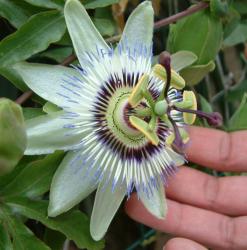Passiflora
Passionflower refers to any of the vines in the Passiflora genus. The plant is famous for its beautiful flowers and is used sometimes as a relaxing sedative herb. Passion flowers are plants of the genus Passiflora. The plants are named for the passion of Christ, because the flower structures seemed symbolic of Jesus' scourging, crowning with thorns and crucifixion. Passifloras are native to tropical and sub-tropical America.
The name is believed to originate from the resemblence of parts of the flower to the instruments of Christ's crucifixion.
The members of this genus produce beautiful flowers that are extensively cultivated, even outside their natural range. Passion fruit, Passiflora edulis, is also cultivated for its fruit, and is extensively grown in the Caribbean and south Florida.
Pollinating maypopLake Junalaska, North Carolina
Maypop (Passiflora incarnata) is a common wildflower in the southern US, as the subtropical representative of this mostly tropical family. Its fruit is edible, but is quite seedy and mostly benefits wildlife. As with other Passifloras, it is the larval food of a number of butterfly species.
Passifloras have unique blossom structure, which requires a large bee to effectively pollinate (see photo: right). In the American tropics wooden beams are mounted near passionfruit plantings to encourage carpenter bees to nest.
External links
- The Passiflora Society International, agency to promote and inform
- Botanical informaton
- Passiflora online
- Good bug page Maypop as the host plant to the Gulf Fritillary whose life cycle is pictured here
- Passiflora edulis / P. edulis flavicarpa Passifloraceae

